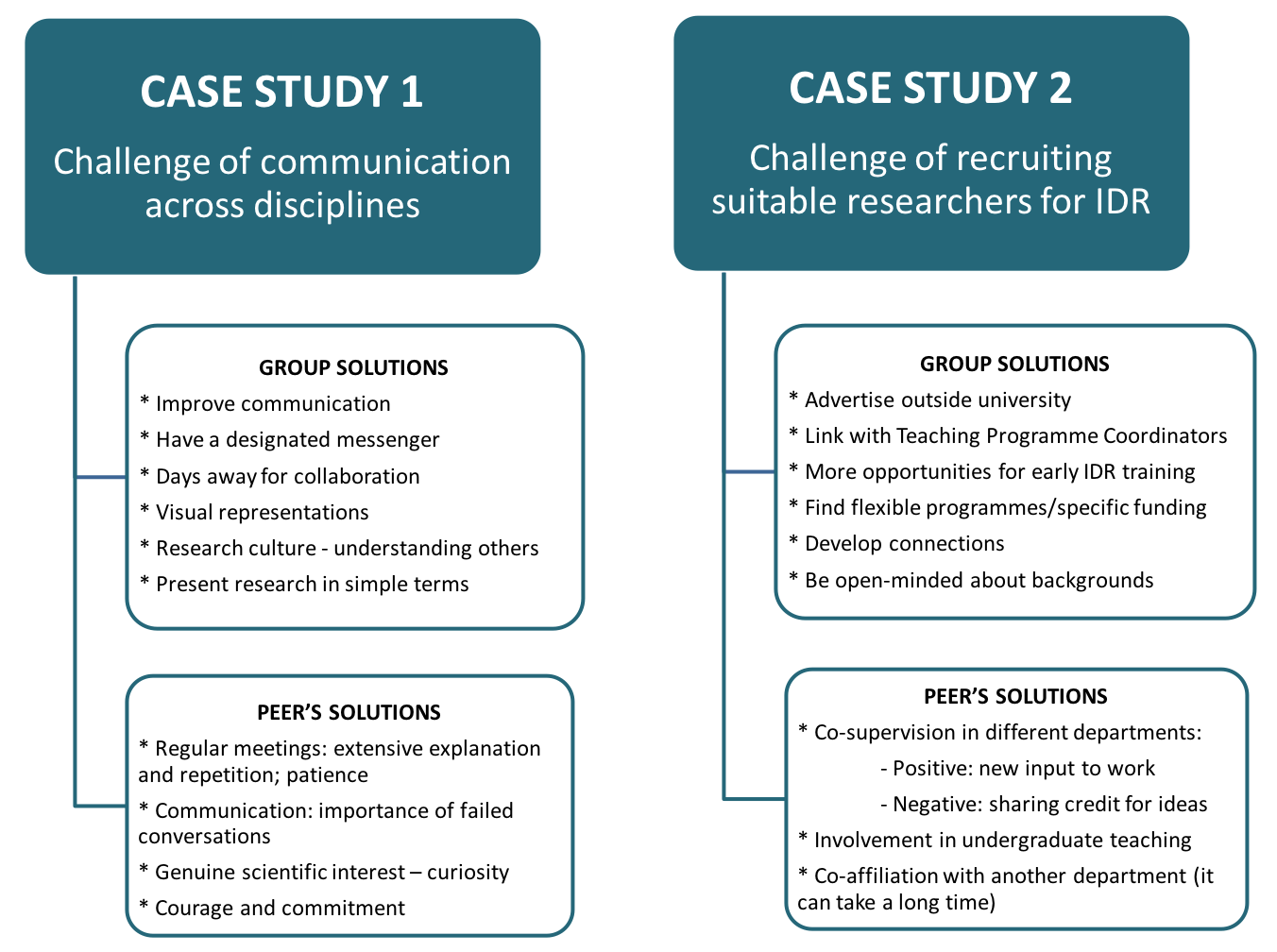The first half of the workshop was focussed on defining common barriers to cross-disciplinary research (A). In the second half, the focus was more on finding solutions to these barriers (B).
A. Defining common barriers

Participants were given four main themes for barriers, which were based on the prevalent barriers reported in the pre-workshop survey data. These were cultural, personal, institutional, and procedural barriers. The following summarises key barriers within each theme.
1. Cultural:
- communication across disciplines causing lack of understanding
- publication and authorship practices with impacts on evaluation
- establishing positive team dynamics, causing lack of trust and understanding between collaborators
2. Personal:
- communication across disciplines
- establishing shared research questions and goals
- finding extra time needed to learn a new discipline
- issues with confidence and research identities
3. Institutional:
- navigating disciplinary structures of universities with implications for progression and evaluation
- finding/applying for funding and being evaluated fairly by funding panels
- lack of training for supervisors and group leads on how to support cross-disciplinarity, and also lack of training for researchers to get up to speed in another discipline
- a perception of not being valued equally or being treated differently
- publishing in discipline-specific journals, and implications for evaluation
4. Procedural:
- getting fair evaluation related to funding, publications and career progression
- issues with supervising/leading others effectively
- lack of training on key skills in another discipline
- need for strong leadership and management locally
B. Finding solutions

In the second half of the workshop participants tried to find solutions to the proposed barriers.
B1. Case studies
Two peers discussed specific challenges they had encountered when crossing disciplines. Small breakout groups then provided solutions for their peers’ challenges. The peers then presented what was actually done to overcome these challenges.

B2. Personal reflections
Participants were given time in small breakout groups of 3-4 to reflect on specific actions they could take to overcome interdisciplinary research barriers. Some of the conclusions are the following:
- “It’s just as difficult to train and recruit cross disciplinary people as it is to be a cross disciplinary trainee”.
- “Starting open dialogue with collaborators to attempt to break down preconceptions about skills/ motivations/ interests and make people feel at ease with working together (rather than being defensive)”.
- “Funding structures and solutions are different in other countries. I learned in a breakout discussion that China, for example, has opened up funding specifically for interdisciplinary research ("top-down" push for interdisciplinarity)”.
- “Change: grant review panels. They need to be better matched to XD research or more flexible, otherwise we end up forcing a grant into UKRI sub-disciplines”.
- "A cultural shift to place more value on interdisciplinary research by funding bodies, training programmes and individual researchers”.
- “Giving early-career XD researchers the correct support so it's less of a lonely transition”.
- "To encourage individuals to apply for cross-disciplinary posts: (1) review the "essential" vs "desirable" criteria - some people will have the ability to learn quickly; (2) include a section on the job description regarding training and support that will be made available for the post-holder”.
C. Further resources
Links to further resources were provided to help participants to find appropriate support.
Experiences from biomedicine
- Knapp B, BardenetR, BernabeuMO, BordasR, BrunaM, Calderhead B, et al. (2015) Ten Simple Rules for a Successful Cross-Disciplinary Collaboration. PLoSComputBiol,11(4): e1004214. https://doi.org/10.1371/journal.pcbi.1004214
- Ponting C. P. (2020) Genetics Needs Non-geneticists.Trends in genetics,36(9), 629–630. https://doi.org/10.1016/j.tig.2020.06.015
Key guides and toolkits
- A series of short guides to interdisciplinary research -https://www.wiki.ed.ac.uk/display/ISSTIInterdisciplinary/Interdisciplinary+Briefing+Notes
- SHAPE-ID toolkit (Shaping interdisciplinary practices in Europe) –tools and resources for interdisciplinary research (particularly between AHSS and STEM subjects). https://www.shapeidtoolkit.eu/
- For UoE researchers see also new resource for ID research https://uoe.sharepoint.com/sites/InterdisciplinaryResearch
For career progression
- Lyall, C. (2019) Being an Interdisciplinary Academic: How Institutions Shape University Careers. Palgrave Pivot. https://doi.org/10.1007/978-3-030-18659-3
- Woollen, E. (2019) Interdisciplinary Research: making the most of the opportunities and navigating the challenges for early career researchers, IAD University of Edinburgh. Available at https://edin.ac/2OQ5zRT
- Interdisciplinary conversations, IAD University of Edinburgh–series of interviews with interdisciplinary researchers discussing all manner of interdisciplinary issues. Available at https://blogs.ed.ac.uk/iad4researchers/category/uncategorized/interdisciplinary-conversations/
For collaborations
- Bennett et al. (2018) Collaboration and Team Science: A Field Guide (2nded). National Cancer Institute, US Department of Health & Human Services. Available at https://www.cancer.gov/about-nci/organization/crs/research-initiatives/team-science-field-guide/collaboration-team-science-guide.pdf
- Gadlin, H. & Jessar, K., Pre-empting Discord: Prenuptial Agreements for Scientists, NIH Ombudsman. Available at https://ori.hhs.gov/preempting-discord-prenuptial-agreements-scientists
- Lyall, C., Bruce, A., Tait, J., & Meagher, L. (2011) Interdisciplinary Research Journeys: Practical Strategies for Capturing Creativity. London: Bloomsbury Academic. Available at: http://dx.doi.org/10.5040/9781849661782In particular chapters 3 & 4
- Confusion in collaboration, IAD University of Edinburgh. A set of questions to help researchers reduce confusion in collaborations. Available at https://edin.ac/3yFR5eG
Final Survey Report
Permanent link to the final survey report: https://hdl.handle.net/1842/39337

